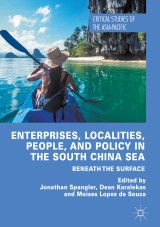Details

Enterprises, Localities, People, and Policy in the South China Sea
Beneath the SurfaceCritical Studies of the Asia-Pacific
|
128,39 € |
|
| Verlag: | Palgrave Macmillan |
| Format: | |
| Veröffentl.: | 16.11.2017 |
| ISBN/EAN: | 9783319628288 |
| Sprache: | englisch |
Dieses eBook enthält ein Wasserzeichen.
Beschreibungen
<p>This volume takes readers beneath the surface of the South China Sea by exploring critical but under-researched issues related to the maritime territorial disputes. It draws attention to the importance of private sector, civil society, and subnational actors’ roles in the disputes and sheds light on key policy issues that are addressed less often in the literature. By going beyond mainstream analyses focused solely on issues of traditional security, resource economics, and international law, it offers a fresh and engaging look at the South China Sea disputes. The book is divided into five parts – historical foundations, enterprises, localities, people, and policy – and its chapters investigate historiography in the region, the global defense industry’s role as beneficiary of the disputes, tourism as a territorial strategy, the roles of provinces and local governments, disaster management, confidence-building measures, environmental and science diplomacy, and other topics seldom discussed in other analyses of the South China Sea disputes. The book’s diverse content and fresh perspectives make it an essential read not only for policymakers and those in the international relations community but also for all others interested in gaining a more well-rounded understanding of the many issues at stake in the South China Sea maritime territorial disputes.</p>
<p>Chapter 1: Writing the History of the South China Sea Disputes Bill Hayton.- Chapter 2: Undisputed Winners: The Benefits and Beneficiaries of the South China Sea Maritime Territorial Disputes Jonathan Spangler.- Chapter 3: Tourism as a Territorial Strategy in the South China Sea Ian Rowen.- Chapter 4:The Role of Provinces in Decision-making Processes in China: The Case of Hainan Province Olga Daksueva and Joyce Juo-yu Lin.- Chapter 5: Tier 2 Diplomacy: Local Government Cooperation Amid Tensions in the South China Sea Mark Hendersen.- Chapter 6: Disaster Management in the South China Sea: A Chance for Peace and Cooperation Gregory Coutaz.- Chapter 7: South China Sea and Political Demography: The Cases of Vietnam and the Philippines Filippo Maranzana De Filippis.- Chapter 8: Beneath the Surface of Consensus: The Development of Confidence-Building Measures between the PRC and ASEAN in the South China Sea Disputes Moises Lopes de Souza.- Chapter 9:South China Sea as Microcosm of ChineseForeign Policy and Prospects for Asian Polarization Dean Karalekas.- Chapter 10: Science Diplomacy and Dispute Management in the South China Sea James Borton.</p>
<p><b>Jonathan Spangler</b> is the Director of the South China Sea Think Tank and President of the Asia-Pacific Policy Research Association. His research focuses on Asia-Pacific regional security, maritime territorial disputes, and cross-strait relations, with an emphasis on the effects of actor involvement on trends of escalation and de-escalation in the South China Sea. </p> <p> <b>Dean Karalekas</b> is the Co-founder and Associate Editor of <i>Strategic Vision for Taiwan Security</i>, published by the Taiwan Center for Security Studies and the ROC’s National Defense University. His research focuses on emergency and disaster management and civil–military relations. He spent several years as a journalist, educator, and immigration consultant in East Asia.</p><p></p> <p><b>Moises Lopesde Souza</b> is a Researcher in Asia Studies at the International Relations Research Center of the University of São Paulo and an Associate Researcher at the Center of Latin-America Economy and Trade Studies at Chihlee Institute of Technology, Taipei. His research focuses on Chinese foreign policy and maritime territorial disputes in East Asia.</p><p></p>
This volume takes readers beneath the surface of the South China Sea by exploring critical but under-researched issues related to the maritime territorial disputes. It draws attention to the importance of private sector, civil society, and subnational actors’ roles in the disputes and sheds light on key policy issues that are addressed less often in the literature. By going beyond mainstream analyses focused solely on issues of traditional security, resource economics, and international law, it offers a fresh and engaging look at the South China Sea disputes. The book is divided into five parts – historical foundations, enterprises, localities, people, and policy – and its chapters investigate historiography in the region, the global defense industry’s role as beneficiary of the disputes, tourism as a territorial strategy, the roles of provinces and local governments, disaster management, confidence-building measures, environmental and science diplomacy, and other topics seldom discussed in other analyses of the South China Sea disputes. The book’s diverse content and fresh perspectives make it an essential read not only for policymakers and those in the international relations community but also for all others interested in gaining a more well-rounded understanding of the many issues at stake in the South China Sea maritime territorial disputes.<p></p>
Raises awareness of under-researched issues related to the South China Sea maritime territorial disputes Discusses the importance of private sector, civil society, and subnational actors’ perspectives Sheds light on key policy issues that are addressed less often in the literature
Diese Produkte könnten Sie auch interessieren:

How Insights from Moral Psychology and Character Research can aid Development Cooperation

von: Jan Prothmann

13,99 €
















